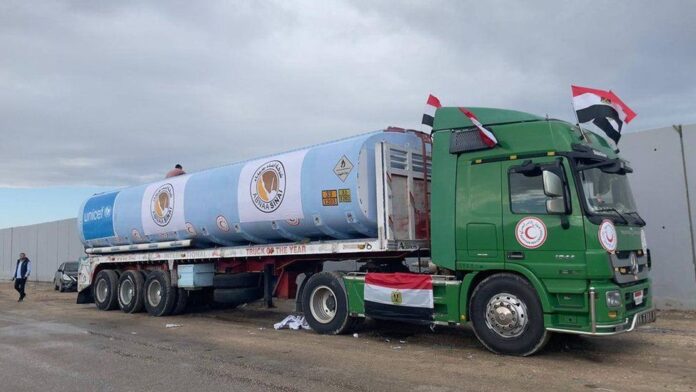In a critical development, the first truck delivering fuel to the Gaza Strip since the imposition of a total siege by Israel began its journey from Egypt on Wednesday, according to two Egyptian security sources.
The delivery comes after Israel approved 24,000 litres (6,340 gallons) of diesel fuel to enter Gaza for UN aid distribution trucks. However, this approval does not extend to using energy in hospitals as a humanitarian source.
Despite limited deliveries of humanitarian aid from Egypt since October 21, Israel had previously refused fuel entry, citing Hamas’s purported substantial fuel stocks.
The United Nations had issued warnings recently, expressing concerns about the depletion of fuel stocks, which could halt humanitarian operations, including the distribution of relief within Gaza.
Aid workers on the ground highlight the critical role of fuel, which is necessary for hospital generators, water provision, and the distribution of relief, contributing to a severe deterioration of living conditions for Gaza’s 2.3 million residents.
The initial delivery of 24,000 litres of fuel will be distributed over two days, with 12,000 litres allocated for each day, according to an international source familiar with the operation.
However, concerns are raised about the adequacy of this amount, with the source stating, “This is not enough for anything – not for hospitals, not even for aid deliveries. It’s meant to be enough only to bring some of the aid that has been outside – and got rained on, for example – indoors to the warehouses.”
Witnesses report that two additional trucks are queued on the Egyptian side of the Rafah crossing, awaiting entry into Gaza. The timing of their entry remains to be determined.
The backdrop of this fuel delivery is rooted in Israel’s military campaign initiated to eradicate Hamas, triggered by Hamas fighters crossing into southern Israel on October 7.
Israel claims that 1,200 people were killed, and approximately 240 captives were taken in response to the attack. In contrast, Gaza health officials contend that more than 11,000 Palestinians have been confirmed killed in Israel’s military offensive.
As the fuel delivery marks a pivotal moment in addressing Gaza’s humanitarian crisis, the international community closely watches the unfolding situation, urging a comprehensive and sustainable resolution to alleviate the suffering of the people in Gaza.
The challenge remains to balance political considerations with the urgent need for humanitarian aid to avert a worsening catastrophe in the region.
This article was created using automation technology and was thoroughly edited and fact-checked by one of our editorial staff members

